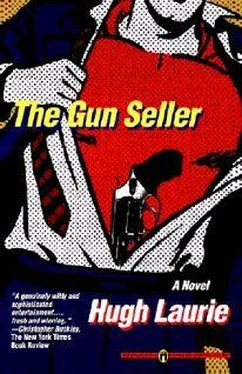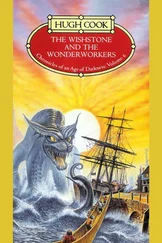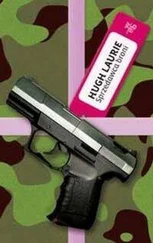Hugh Laurie - The Gun Seller
Здесь есть возможность читать онлайн «Hugh Laurie - The Gun Seller» весь текст электронной книги совершенно бесплатно (целиком полную версию без сокращений). В некоторых случаях можно слушать аудио, скачать через торрент в формате fb2 и присутствует краткое содержание. Жанр: Шпионский детектив, на английском языке. Описание произведения, (предисловие) а так же отзывы посетителей доступны на портале библиотеки ЛибКат.
- Название:The Gun Seller
- Автор:
- Жанр:
- Год:неизвестен
- ISBN:нет данных
- Рейтинг книги:4 / 5. Голосов: 1
-
Избранное:Добавить в избранное
- Отзывы:
-
Ваша оценка:
- 80
- 1
- 2
- 3
- 4
- 5
The Gun Seller: краткое содержание, описание и аннотация
Предлагаем к чтению аннотацию, описание, краткое содержание или предисловие (зависит от того, что написал сам автор книги «The Gun Seller»). Если вы не нашли необходимую информацию о книге — напишите в комментариях, мы постараемся отыскать её.
The Gun Seller — читать онлайн бесплатно полную книгу (весь текст) целиком
Ниже представлен текст книги, разбитый по страницам. Система сохранения места последней прочитанной страницы, позволяет с удобством читать онлайн бесплатно книгу «The Gun Seller», без необходимости каждый раз заново искать на чём Вы остановились. Поставьте закладку, и сможете в любой момент перейти на страницу, на которой закончили чтение.
Интервал:
Закладка:
This, in the beginning, was good for Gaine Parker. If you can make a lavatory seat that pleases the head Woolworths buyer, you’re quids in. If you can make one that pleases the US government, by conforming to the specifications demanded of a military lavatory seat - and I assure you that there is such a thing, and it has specifications, and at a guess I’d say those specifications probably cover thirty sides of A4 paper - if you can do that, well, then you’re quids in, out, round to the front and in again, a million times over.
As it happened, Gaine Parker didn’t make lavatory seats. They made an electronic switch that was very small and did something clever with semi-conductors. As well as being indispensable to the manufacturers of air-conditioning thermostats, the switch also found a home in the cooling mechanism of a new kind of military-specification diesel generator. And so it came to pass, in February of 1972, that Gaine Parker and Alexander Woolf became sub-contractors to the US Department of Defense.
The blessings of this contract were without number. Besides allowing, or even encouraging, Gaine Parker to charge eighty dollars for an item that elsewhere in the market would be lucky to fetch five, the contract served as a stamp of guaranteed, no nonsense, blue-chip quality, causing the world’s customers for small, clever, switchy things to beat a wide gravel drive to Woolf’s door.
From that moment, nothing could go wrong, and nothing did. Woolf’s standing in thematerielbusiness grew and grew, and his access to the very important people who run that world - and who therefore could safely be said to runtheworld - grew with it. They smiled at him, and joked with him and put him up for membership of the St Regis golf club onLong Island. They called him atmidnight for long chats about this and that. They asked him to go sailing with them in the Hamptons, and, more importantly, accepted his return invitation. They sent his family Christmas cards, and then Christmas presents, and, eventually, they began to wine him at two hundred-seat Republican party dinners, where much talk was exchanged on the subject of the budget deficit andAmerica ’s economic regeneration. And the higher he rose, the more contracts came his way, and the smaller, and more intimate, the dinners became. Until, finally, they stopped having much to do with party politics at all. They had more to do with the politics of common sense, if you follow me.
It was at the end of one of these dinners that a fellow admiral of industry, his judgement skewed by a couple of pints of claret, told Woolf about a rumour he had come across. The rumour was a fantastic one, and Woolf, of course, didn’t believe it. In fact, he found it funny. So funny, that he decided to share the laugh with one of the very important people, during one of their regular late-night phone-calls - and found that the line had gone dead before he’d reached the punch line.
The day Alexander Woolf decided to take on the military industrial complex was the day everything changed. For him, for his family, for his business. Things changed quickly, and they changed for good. Roused from its slumber, the military-industrial complex lifted a great, lazy paw, and swatted him away, as if he were no more than a human being.
They cancelled his existing contracts and withdrew possible future ones. They bankrupted his suppliers, disrupted his labour force, and investigated him for tax evasion. They bought his company’s stock in a few months and sold it in a few hours, and when that didn’t do the trick, they accused him of trading in narcotics. They even had him thrown out of the St Regis, for not replacing a fairway divot.
None of which bothered Alexander Woolf one bit, because he knew that he’d seen the light, and the light was green. But it did bother his daughter, and the beast knew this. The beast knew that Alexander Woolf had started out in life with German as his first language, andAmerica as his first religion; that at seventeen, he was selling coat-hangers out of the back of a van, living alone in one basement room inLowes,New Hampshire, with both parents dead and not ten dollars to his name. That was what Alexander Woolf had come from, and that was what he was prepared to go back to, if going back was what it took. To Alexander Woolf, poverty was not the dark, or the unknown, or a thing to be feared in any way. At any time of life.
But his daughter was different. His daughter had experienced nothing but big houses, and big swimming pools, and big cars, and big orthodontistry treatments, and poverty frightened her to death. The fear of the unknown was what made her vulnerable, and the beast knew that too.
A man had made her a proposition. ‘So,’ she said.
‘Well quite,’ I said.
Her teeth were chattering, which made me realise how long we’d been sitting there. And how much I still had left to do.
‘I’d better take you home,’ I said, getting to my feet. Instead of getting up with me, she curled tighter to the bench, her arms folded across her stomach as if she was in pain. Because she was in pain. When she spoke, her voice was incredibly quiet, and I had to squat down at her feet to hear. The lower I got, the more she bowed her head to avoid my eyes.
‘Don’t punish me,’ she said. ‘Don’t punish me for my father’s death, Thomas, because I can do that without your help.’
‘I’m not punishing you, Sarah,’ I said. ‘I’m just going to take you home, that’s all.’
She lifted her head and looked at me again, and I saw a new fear sliding into her eyes.
‘But why?’ she said. ‘I mean, we’re here, now. Together. We can do anything. Go anywhere.’
I looked down at the ground. She hadn’t got it yet. ‘And where do you want to go?’ I asked.
‘Well it doesn’t matter, does it?’ she said, her voice getting louder as the desperation grew. ‘The point is we can go. I mean, Christ, Thomas, you know… they controlled you because they threatened me, and they controlled me because they threatened you. That’s how they did it. And that’s over now. We can go. Take off.’
I shook my head.
‘I’m afraid it’s not that simple now,’ I said. ‘If it ever was.’ I stopped and thought for a moment, wondering how much I ought to tell her. Nothing, is what I really ought to tell her. But fuck it.
‘This thing isn’t just about us,’ I said. ‘If we just walk away, other people are going to die. Because of us.’
‘Other people?’ said Sarah. ‘What are you talking about? What other people?’
I smiled at her, because I wanted her to feel better, and not so scared, and also because I was remembering them all. ‘Sarah,’ I said. ‘You and I…’
I faltered. ‘What?’ she said.
I took a deep breath. There was no other way of saying it. ‘We have to do the right thing,’ I said.
Twenty-three
But there is neither East nor West, Border, nor Breed, nor Birth, When two strong men stand face to face, though they come from the ends of the earth.
RUDYARD KIPLING
Don’t go toCasablanca expecting it to be like the film.
In fact, if you’re not too busy, and your schedule allows it, don’t go toCasablanca at all.
People often refer toNigeria and its neighbouring coastal states as the armpit ofAfrica; which is unfair, because the people, culture, landscape, and beer of that part of the world are, in my experience, first rate. However, it is true that when you look at a map, through half-closed eyes, in a darkened room, in the middle of a game of What Does That Bit Of Coastline Remind You Of, you might find yourself saying yes, all right,Nigeria does have a vaguely armpitty kind of shape to it.
Bad luckNigeria.
But ifNigeria is the armpit,Morocco is the shoulder. And ifMorocco is the shoulder,Casablanca is a large, red, unsightly spot on that shoulder, of the kind that appears on the actual morning of the day that you and your intended have decided to head for the beach. The sort of spot that chafes painfully against your bra strap or braces, depending on your gender preference, and makes you promise that from now on you’re definitely going to eat more fresh vegetables.
Читать дальшеИнтервал:
Закладка:
Похожие книги на «The Gun Seller»
Представляем Вашему вниманию похожие книги на «The Gun Seller» списком для выбора. Мы отобрали схожую по названию и смыслу литературу в надежде предоставить читателям больше вариантов отыскать новые, интересные, ещё непрочитанные произведения.
Обсуждение, отзывы о книге «The Gun Seller» и просто собственные мнения читателей. Оставьте ваши комментарии, напишите, что Вы думаете о произведении, его смысле или главных героях. Укажите что конкретно понравилось, а что нет, и почему Вы так считаете.












